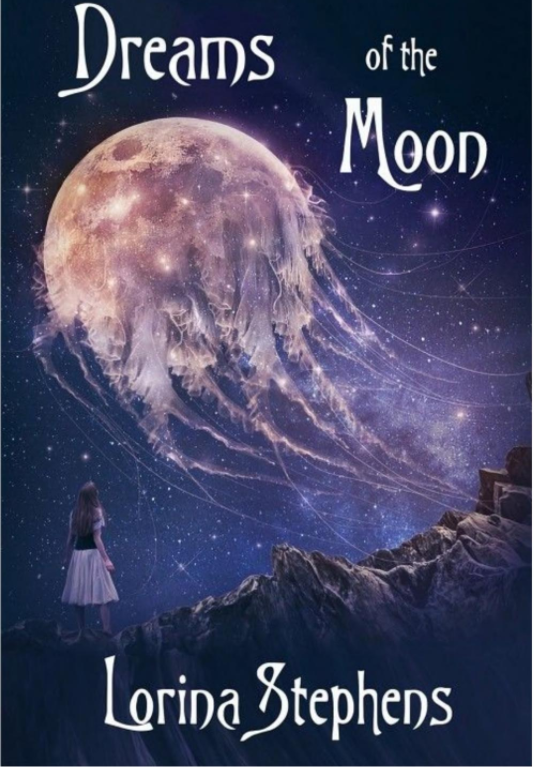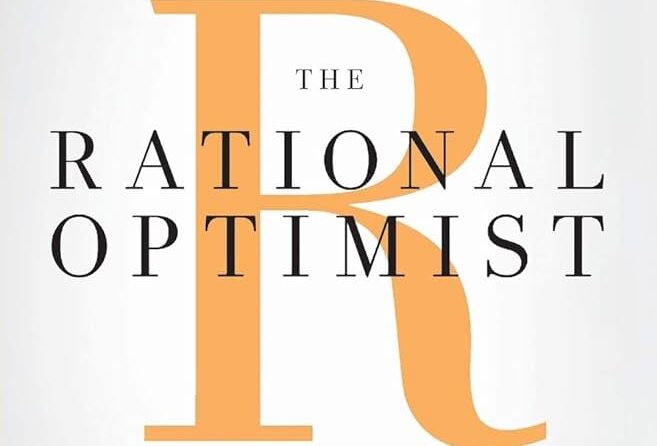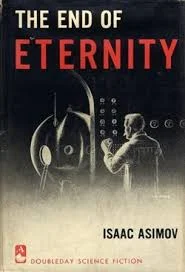
OBIR: Occasional Biased and Ignorant Reviews reflecting this reader’s opinion.
DREAMS OF THE MOON, a collection of short fiction – by Lorina Stephens
Publisher: Five Rivers Publishing, 704 Queen Street, P.O. Box 293, Neustadt, Ontario, Canada, N0G 2M0. Published June, 2021.
Cover art by Jessica Allain.

Dreams of the Moon
Premise:
“Sariel, the last Elohim Angel defender of the Garden of Eden, contemplates defeat and failure.
Review:
Though an atheist, I was raised Baptist and have read the Bible from cover to cover. So I was able to appreciate the poignant, despairing musings of a blinded, battle-weary angel with a broken wing, the last of his kind. And rejoice that the Nephalim had successfully retreated from Eden to the Cave of Treasures within Mount Harmon. Except, what? I don’t seem to remember this particular biblical tale. Never heard of Sariel, for instance. Let alone that he is the angel of death.
A quick Googling revealed he is one of the seven Archangels of the Earth, that his many roles include punishing both men and angels who disobey God, and that he can be found in the Bible, the Book of Enoch, the Jewish Talmud, and the Dead Sea Scrolls. Quite the pedigree! But his nature is much debated by religious scholars. This makes him a wonderful study for a fictional treatment which Lorina has taken full advantage of.
I don’t know how much of this story is “true,” in terms of source references, and how much is creative imagining, but it comes across as a Miltonesque prose poem about an anguished “fallen” angel whose fall is no fault of his own. To my way of thinking this is high fantasy on a lyrical binge. Sad, but moving. Besides, a defeated hero contemplating life’s wounds is always interesting. I’m no angel groupie, but I quite enjoyed this.
At Union
Premise:
Toronto’s Union Station is a portal allowing a busy executive to commune with his dead daughter.
Review:
Not exactly a ghost story, but horror nevertheless. Never mind seances or trying to focus on pale wisps of your deceased loved ones; imagine communicating with them as vividly and realistically as turning to the next passenger waiting on the platform and saying “hello.”
The plot revolves around the father wanting more than just brief contacts. Prolonged dialogue is on his bucket list. Trouble is, what do the dead have to talk about? All sorts of questions are raised. What’s it like being dead? Is visiting the realm of the living a good thing, or an annoyance and a burden? All things considered, is it preferable to be dead? Or, if resurrection is only temporary, is it cruel to bring it about? Is it a selfish act on the part of the father? Or is it an opportunity of some kind? What should the role of the father be? The role of the deceased daughter? Do they even really know what they want? Or not want?
Nothing is simple in life. There are no easy answers. One should not expect communing with the dead to do anything but raise more questions. This story explores death the way most philosophers explore life. And yet, at its core, it’s really about coping with loss. Makes you think, this story does. That be its value. Not just a “Boo!” story, but a lesson in life.
Gravity
Premise:
An elderly woman who has lost both her husband and her daughter struggles to complete a mechanical toy she once intended to give to her child but never got around to completing.
Review:
The toy is something magnificent, an amazing device in the centuries old tradition of clockwork mechanisms that imitate life. Would her daughter have appreciated such an archaic mechanism? After all, she lost her life orbiting and investigating a distant black hole. Marvellous though the toy be, it might have held no meaning for the child. But now, in the permanent absence of her daughter, it holds all the meaning remaining in the world for the mother. A sad and poignant tale.
Its conclusion is almost identical to the finish of a certain type of dream I occasionally experience. The ending is always the same. So this story impacted me personally, which increased its emotional power. I can’t explain, however, as that would give away the story. Suffice to say, to a certain extant, I can identify with the mother’s feelings. Probably, for reasons to do with your imagination and your empathy, you will too.
Wendy
Premise:
Wendy keeps a good Inn, clean and comforting, much like herself. Trouble is, eventually she has to disappear and start up a new business elsewhere, lest people begin to suspect she possesses more than mortal powers.
Review:
Difficult to review without giving everything away. I’ll just say it’s a nice bit of historical research combined with a new take on an ancient science fiction theme toned down and focused down to an unusually intimate level which strikes me as highly original. That something of usually profound and shattering impact on humanity at large could be used as a vehicle for gentle and caring compassion is something of a revelation.
Writers take note. This is how you inject fresh meaning and insight into old tropes. Very ingenious and extraordinarily humane. Not utopian SF, but definitely a refreshing contrast to the usual dire dystopian approach so common in the genre. Want to write positive science fiction? This is a splendid example. Gritty enough to be “real,” yet ultimately pleasantly reassuring and upbeat.
A perfect Spell
Premise:
A powerful wizard realized his life’s dream by casting a powerful spell. Pity it didn’t work out the way he intended.
Review:
To be trapped in a magic-drenched tower is one thing. To be trapped forever, as a consequence of your own actions, is humiliating. That it was due to your desire to perpetuate the great love of your life hardly justifies a life of repetitive tedium. Excessive punishment for a mere act of hubris. At least she still loves you, but how bored and frustrated you have both become. No wonder you both crave something new and different will occur. Anything. Anything at all.
Couldn’t help but see this as a metaphor for my life during certain periods of necessary but unpleasant employment. The jobs that usually advertise under the heading “must enjoy a challenging environment.” I know what it is to be trapped in a perpetual future of endless boredom and torment. So, I thoroughly identify with the wizard’s problem. He has fewer options than I did. This makes his quest for a solution all the more interesting.
The Intersection
Premise:
A woman experiences an overwhelming panic attack. She desperately seeks help.
Review:
This story was originally published in The Strangers Among Us anthology edited by Susan Forest. In February I snapped it up for publication in Polar Borealis Magazine #20 which will appear later this year. And here it is in Dreams of the Moon. The story certainly has traction. I would say justifiably so.
It’s short, but vivid. I can relate because many years ago I witnessed a similar incident at the corner of Granville and Robson in Vancouver. The sidewalk was so wide a blind woman lost all sense of where she was and began whirling with her arm and cane outstretched, a human pinwheel, screaming in fear and shock. Those around her, myself included, stepped back to avoid being struck. Then several people, myself included, attempted to move forward to help her, but could find no opening, so rapidly was she spinning. She was screaming so loudly I doubt she could hear the people attempting to calm her with soothing voices. One young woman, more nimble than the rest of us, managed to dart forward and grab her other arm. This shocked her to a halt. A rapid conversation ensued and soon the panic-stricken woman had recovered to the point of listening and being led to where she wanted to go. I think everyone who witnessed the entire affair was somewhat shaken. I’ve never forgotten the plight of that poor woman.
Consequently, this story doesn’t strike me as being at all far-fetched. Panic attacks are very real, very serious, and almost impossible to exaggerate. The situation is credible. What is nifty is the solution which depends on extrapolation of current technology in a very personal and caring manner. Another positive work of science fiction. There’s hope for us yet.
Civil Liberties
Premise:
A genetic biologist on a space station orbiting Saturn is finding it difficult both justifying her salary and raising her teenage son.
Review:
Teenagers are apt to want things right away and who cares how much it costs? Peer pressure and loss of face are far more important than what their parents do. An age-old story. How can a parent teach the value of work and money? Turns out, when survival depends on the work you provide and there’s no room for unproductive slackers, in not-so-subtle ways that people living back on Earth don’t have to worry about, it’s surprisingly easy on board a space station to drive home the message.
Again. Lorina utilizes up-close and-personal intimacy to comment on larger issues. No matter what the situation, her focus is always on the individuals involved. There are no essays here. Only people struggling to cope. This technique makes it easy for the reader to relate to what is going on and consider the implications. A window to contemplation and reflection.
A Bear at the Fridge
Premise:
Wandering naked into the kitchen at 3:00 a.m. proves most disconcerting for a woman home alone. She hadn’t expected to see a massive grizzly daintily guzzling soft drinks from her fridge, let alone hear it address her in a jovial, familiar fashion.
Review:
This story was originally published in issue #6 of my magazine Polar Borealis. I liked it then. I like it now. It’s very short and very striking. More of a vignette than a story, one that takes a basic fantasy concept and runs with it in a new direction. Normally, the underlying concept, once understood, has assorted traditional assumptions on the part of the reader built in. But this is something different, something awkward. Serves to illustrate that nothing can be taken for granted, not in reality, nor in fantasy. Both realms are always far more complicated than you anticipate. This story illustrates that in a pleasant, subtle fashion. Cheerfully entertaining.
Fall Arrest
Premise:
Alice finally has a job in Wonderland, the task of getting Humpty Dumpty safely down from his wall. As usual, the Mad Hatter is not being very helpful.
Review:
A delightful story introducing bureaucracy into Wonderland. The story allows assorted denizens to be themselves in new yet typical ways. The Mad Hatter in particular. Don’t know if he is truly mad, but he is certainly devious, possibly by design, possibly by accident. Always a mistake to put faith and trust in him. The King’s Horses and King’s Men aren’t exactly proverbially useful either. But then, neither is the ambient reality. Kudos to Alice for trying to impose rationality on an irrational world. It helps to be patient and stubborn. I suspect that’s the moral of the story. Loads of fun.
Occupational Hazards, or, the Quite Curious Tale of Astridr Grimsdottir
Premise:
“Eric Connor is an artist racing against a deadline to paint a cover for a magazine. When the character in the illustration begins criticizing his technique he’s more than a little surprised, not to mention upset.
Review:
Artists expect criticism from multiple sources as a result of illustrating someone’s story, most often from the writer of the piece, but sometimes from the editor, the public, critics and other people who like to complain. But getting lip from the art itself? Enough to drive a creative talent to switch to creative accounting or some other more respectable profession.
Again, something of a vignette, a single scene, but a light-hearted hoot to read. And again, employing the technique of setting out a “normal” situation and quickly throwing the unexpected into the works so that all bets are off and anything might happen. An unsettling and effective way of introducing originality into the readers experience. Always an unanticipated but appreciated surprise. Lorina is quite good at this.
The Rose Guardian Preview: Endings
Premise:
Violet endures her mother’s funeral as best she can. Her mother had been an enigmatic woman, easy to respect but hard to love. Consequently, the funeral was an emotionless desert. Even worse would be the wake after the funeral.
Review:
This is a sample chapter from Lorina’s novel The Rose Guardian. I haven’t read it yet, but I gather it is a sort of magic realism piece, hints of which appear in this chapter. It is an adroit introduction to multiple characters and the tensions between them which suggest all manner of possibilities for conflict. I suspect the greatest turmoil will be deep within the mind of Violet as she struggles to place her mother’s legacy in a context acceptable to her continued sanity. This may be in doubt, for certain hints in this chapter lead me to believe she will somehow be able to communicate with what her mother had been before she became the cold monolith who raised her. Possibly I am reading too much into this sample. Misreading it. Speculating in the wrong direction. At any rate, my curiosity is piqued. That be the point of including this chapter in the collection, methinks. Sound marketing.
CONCLUSION:
Quite deliberately, as she explains in her introduction, Lorina begins with serious stories addressing dark issues and slowly transitions to stories that are just plain fun to read. This is a good strategy. It offers the reader a wide variety of stories and leaves the reader feeling upbeat and chuckling. (Though The Rose Guardian sample subverts this pattern, but it’s an addition rather than an element of the collection’s flow.)
All the stories in the collection share two techniques. First, Lorina likes to startle the reader with unusual and original takes on what at first seem standard or ordinary themes, thus upending the readers’ expectations and forcing them to think perhaps more than they had originally intended. And second, by narrowing the focus to the intimate reactions and puzzled thoughts of the protagonists, Lorina avoids distancing-abstractions which examine mere concepts, in favour of a deeply personal struggle which makes it remarkably easy for the reader to identify with and relate to the characters. No matter what the setting and sub-genre, these stories are about characters and their emotions. Yet there is no stereotypical New Wave angst on display. Lorina is far too subtle for that. So to speak, these stories are about “down-to-Earth” people who are genuine individuals.
Dreams of the Moon is a good example of a collection of pieces relating to universal themes addressed in an eminently readable and relatable manner which I believe every reader will find interesting, entertaining, and above all, personally meaningful. Not every writer can do that. Lorina makes it seem easy. That takes a masterful level of talent. These are very balanced, insightful, addictive stories. I’m impressed.
Check it out at: < Dreams of the Moon Preorder > Available June 1st, 2021.









